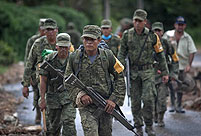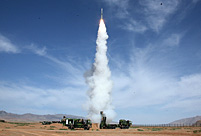"In the short term, it will have a bad impact on CNPC in both its public image and its listed-company PetroChina's share price,"he said. "However, from a long-term perspective, the case will not bring too many changes to the company concerning its businesses.”
Unlike in private companies, the leader of an SOE is not the soul of the company, he said.
"In fact, it doesn't matter too much who in particular will become the head of an SOE, but stricter supervision and better management matter.”
The probes on Jiang, Wang, Li and others show the central government's determination and clear attitude to crack down on corruption, said Zhang Yi, vice-chairman at SASAC.
He said the investigations are individual problems and that the central government still acknowledges the achievements and contribution of CNPC.
"The most important task for CNPC is ensuring stable development, production and safety,"said Zhang.
On Sept 4 and 5, Zhang went to CNPC's two major oilfields — Daqing and Changqing — to hold meetings about oil exploration and production safety, to ensure the healthy and stable operation of the oilfields.
The Changqing oilfield is located in Shaanxi province, while the Daqing oilfield is in Heilongjiang province.
Changqing oilfield's annual output has soared from 10 million tons to 20 million tons from 2003 to 2007. In the last year, its oil equivalent output reached 45 million tons, exceeding Daqing oilfield where output was 43.3 million tons.
Wang Daofu and Ran Xinquan, both worked in the Daqing oilfield for years starting in 2003.
According to industrial insiders, during the period that Wang and Ran were in charge of the oilfields, the company sold "low-quality"oil wells to private companies and it was during that process that corruption occurred.
So-called "low-quality"oil wells are those with low output and high costs, including taxes and fees.


 Storms leave 97 dead, 58 missing in Mexico
Storms leave 97 dead, 58 missing in Mexico New model of indigenous surface-to-air missiles testfired
New model of indigenous surface-to-air missiles testfired  118.28-carat diamond to be auctioned in HK
118.28-carat diamond to be auctioned in HK Maternal love under streetlight
Maternal love under streetlight Naked foreign student sits in the middle of a road in Haikou
Naked foreign student sits in the middle of a road in Haikou  Colorful Yunnan: Enjoy the natural beauty
Colorful Yunnan: Enjoy the natural beauty Harbin named Chinese city with most beautiful women
Harbin named Chinese city with most beautiful women New college students' military training in Guangzhou
New college students' military training in Guangzhou Rugby girls
Rugby girls PLA's 38th Group Army conduct training
PLA's 38th Group Army conduct training Residences of the royal house of Savoy
Residences of the royal house of Savoy The last days of Wan Aihua
The last days of Wan Aihua Highlights at 12th National Games of China
Highlights at 12th National Games of China Beijing Film Academy welcomes freshmen
Beijing Film Academy welcomes freshmen Large mahjong party sets new world record
Large mahjong party sets new world recordDay|Week|Month